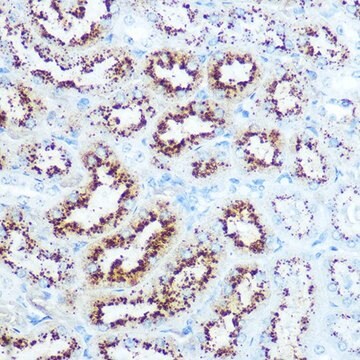SAB4200774
Anti-Shiga Toxin 1, B Subunit (STxB) antibody, Mouse monoclonal
clone 13C4, purified from hybridoma cell culture
Synonyme(s) :
Anti-SLT-1 B subunit, Anti-SLT-1b, Anti-Shiga-like toxin 1 subunit B, Anti-Verocytotoxin 1 subunit B, Anti-Verotoxin 1 subunit B, Anti-stxB
About This Item
Produits recommandés
Source biologique
mouse
Niveau de qualité
Forme d'anticorps
purified from hybridoma cell culture
Type de produit anticorps
primary antibodies
Clone
13C4, monoclonal
Description
Research area: Microbiome
Forme
buffered aqueous solution
Poids mol.
~7 kDa
Espèces réactives
E. coli
Concentration
~1.0 mg/mL
Technique(s)
flow cytometry: 2.5-5 μg/test using human RAMOS cells pretreated with recombinant Shiga toxin 1, B subunit
immunoblotting: 1-2 μg/mL using purified recombinant Shiga Toxin 1-B subunit produced in E. coli (using PVDF membrane)
immunoprecipitation (IP): suitable
Isotype
IgG1
Numéro d'accès UniProt
Conditions d'expédition
dry ice
Température de stockage
−20°C
Modification post-traductionnelle de la cible
unmodified
Description générale
Spécificité
Immunogène
Application
- immunoblotting
- flow cytometry
- immunoprecipitation
Actions biochimiques/physiologiques
Forme physique
Autres remarques
Vous ne trouvez pas le bon produit ?
Essayez notre Outil de sélection de produits.
Code de la classe de stockage
10 - Combustible liquids
Point d'éclair (°F)
Not applicable
Point d'éclair (°C)
Not applicable
Certificats d'analyse (COA)
Recherchez un Certificats d'analyse (COA) en saisissant le numéro de lot du produit. Les numéros de lot figurent sur l'étiquette du produit après les mots "Lot" ou "Batch".
Déjà en possession de ce produit ?
Retrouvez la documentation relative aux produits que vous avez récemment achetés dans la Bibliothèque de documents.
Articles
An overview of human microbiome research, workflow challenges, sequencing, library production, data analysis, and available microbiome reagents to support your research.
Notre équipe de scientifiques dispose d'une expérience dans tous les secteurs de la recherche, notamment en sciences de la vie, science des matériaux, synthèse chimique, chromatographie, analyse et dans de nombreux autres domaines..
Contacter notre Service technique